By Lindsey Breunig
In the acronym alphabet soup, you are bound to have a couple repeats. If I told you that the BLT program creates opportunities and changes lives, I can understand how you might have a glimmer of doubt. Now, how does a Bacon Lettuce Tomato sandwich have such a strong impact? You see, in my world BLT goes beyond a tasty sandwich…
Better Living for Texans (BLT) is a statewide nutrition education program created by the Texas A&M AgriLife Extension Service (Texas A&M AgriLife). If you are unfamiliar with Texas A&M’s AgriLife Extension Service, do not worry, I too was completely confused (Sic’Em Always).
 Extension Services are nationwide and connected to the state’s Land Grant University. Land Grant Universities were established by Abraham Lincoln through the Morrill Act to connect universities to the community. In Texas, our Land Grant University is Texas A&M. Extension Services bridge America’s universities to local communities. University faculty and staff connect and work with local Extension professionals to apply their expertise and connect community members to research based knowledge.
Extension Services are nationwide and connected to the state’s Land Grant University. Land Grant Universities were established by Abraham Lincoln through the Morrill Act to connect universities to the community. In Texas, our Land Grant University is Texas A&M. Extension Services bridge America’s universities to local communities. University faculty and staff connect and work with local Extension professionals to apply their expertise and connect community members to research based knowledge.
Texas A&M AgriLife reaches every county in the state of Texas. Local needs impact Texas A&M AgriLife’s presence in every county. Some efforts include but are not limited to: mitigating drought impacts, water conservation, landscapes, and production agriculture, improving emergency management, enhancing food security, and protecting human health through education about diet, exercise, and disease prevention and management (BLT!).
Texas A&M AgriLife is literally for everyone. The Texas 4-H program engages youth every year in learning projects, leadership development, and community service. I found this necessary to explain because sometimes to understand a piece you need to see the whole picture. Here in McLennan County you too can find Texas A&M AgriLife Extension Services. Our office is located downtown and houses professionals here to serve the county.
Breaking Down BLT:
Statistics show that 1 out of 6 Texans struggle with food insecurity, hunger, and eat less than the daily recommended allowance of fruits and vegetables. Additionally, Texas children and adults are less physically active than recommended. McLennan County is no exception and it is critical that we change these statistics in a positive direction.
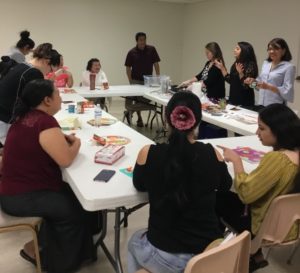 BLT’s target audience is adults and children with limited resources. Whether someone is young or old, BLT was designed to help people prepare healthy meals, improve their physical fitness, save money at the grocery store, grow their own foods, and adopt better food safety habits. We provide facts rather than the latest trends. BLT is here to empower individuals, families, and communities to make positive changes for healthier lives on limited resources.
BLT’s target audience is adults and children with limited resources. Whether someone is young or old, BLT was designed to help people prepare healthy meals, improve their physical fitness, save money at the grocery store, grow their own foods, and adopt better food safety habits. We provide facts rather than the latest trends. BLT is here to empower individuals, families, and communities to make positive changes for healthier lives on limited resources.
BLT programs are delivered in a variety of ways and at different locations. You may see BLT programming at health fairs, community centers, food pantries, church events and, more! Groups or participants can decide from the several available curriculums or request one-time education events or cooking demonstrations. If there is an interest in health and wellness, we are there! Below are our programs topics:
Basic Healthy Living:
Basic Healthy Living covers quite a lot. Topics range from food safety, cooking, preserving, and meal planning. It is our hope that adults increase fruit and vegetable intake, learn to cook nutritious meals, and spend less on groceries. Here we want healthy eating to be practical and attainable for everyone. We are here to challenge the notion that “it’s too expensive to eat healthy.”
Healthy Aging:
Healthy Aging is similar to Basic Healthy Living but focused on seniors. In our programs we talk about steps to remain independent by choosing healthy diets and staying physically active.
Maintaining a healthy weight:
Here we do not diet but we establish a healthy eating plan within one’s calorie requirements to achieve and maintain a healthy weight.
Gardening:
The gardening curriculum begins at the basics. Education includes how to select a garden location, learn techniques on how to compost, plant and water, and control insects. Participants learn how to grow fruits and vegetables and learn how to cook with produce grown from their own garden. The BLT program relies on the knowledge from the numerous Master Gardeners (another Texas A&M AgriLife program!) here in Waco. They are a great resource for learning how to grow fruits and vegetables!
Fitness:
Fitness is for EVERYONE, and BLT wants everyone to find their favorite way to get active and moving. We have our statewide challenge called Walk Across Texas (WAT) where people from the community create teams with family, friends, and coworkers to log walking miles; however, miles are not limited to walking. Being active and moving will get you across Texas. There are several other ways BLT works to get folks moving and to include more fruits & vegetables in everyone’s daily routine.
 Although the Better Living for Texan’s program may not promote the daily consumption of a BLT sandwich, BLT is here to make health attainable and practical for all. This done through providing research and evidence-based nutrition, health and wellness knowledge to empower individuals, families, and communities to make positive changes for healthier lives. BLT creates opportunities, and changes lives.
Although the Better Living for Texan’s program may not promote the daily consumption of a BLT sandwich, BLT is here to make health attainable and practical for all. This done through providing research and evidence-based nutrition, health and wellness knowledge to empower individuals, families, and communities to make positive changes for healthier lives. BLT creates opportunities, and changes lives.
If you are interested or want to know more about the Better Living for Texans program here in McLennan County, please do not hesitate to reach out, and ask. We would love to get involved with your group or organization!
Call our office at: 254-757-5180 or email [email protected]
 Lindsey Breunig is a graduate of Baylor University and currently works as the Better Living for Texans Educator for the Texas A&M AgriLife Extension Service. She is originally from Grapevine, TX and now calls Waco home. Here in Waco she loves to venture out to Cameron Park, visit the local Farmers Market, and try out the awesome eateries in Waco. If you see her and hear a loud bark, that’s her pup Lucy just saying hello.
Lindsey Breunig is a graduate of Baylor University and currently works as the Better Living for Texans Educator for the Texas A&M AgriLife Extension Service. She is originally from Grapevine, TX and now calls Waco home. Here in Waco she loves to venture out to Cameron Park, visit the local Farmers Market, and try out the awesome eateries in Waco. If you see her and hear a loud bark, that’s her pup Lucy just saying hello.
By Shelley Cotten
(FYI – Dates and times for Ukulele Orchestra may change from time to time — for most up to date information please check their Facebook Page. Thank you! – ABT)
In June of 2015, my husband and I were on vacation with a dear friend in Sedona, AZ and happened upon the “Largest Ghost Town in America,” Jerome, AZ. While dining at a quaint little downtown restaurant, suddenly the door opened and the place was overtaken by a band of ukulele players who had their instruments, music books and other necessary “equipment” with them. Turns out we had happened upon the local ukulele orchestra’s weekly practice spot and were invited to play along. They had some extra ukuleles with them and, although we had no prior experience with the instruments, it was easy to strum along in rhythm with them (well, the strumming was easy, rhythm maybe not). They were preparing for the upcoming Fourth of July parade and we were sorry that we wouldn’t be there to see it – something about a marching ukulele group just seems like it needs to be witnessed. It was so much fun that when we got back home to Waco, we decided to start a ukulele group here. The first meeting of the Waco Ukulele Orchestra was held in October of 2016.
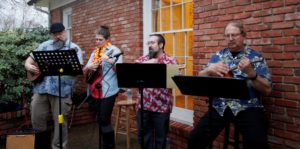 Since then, the group has grown and shrank, ebbed and flowed. Some have come one or a few times and then moved on (literally or figuratively); some music students have come for extra credit; some have come searching for community and a place of respite from the daily grind. Whatever the reason, we have been blessed with a variety of personalities, stories, and musical abilities. The group ranges in age from high school to retired, and in ability from beginner to “expert.” Our high school player is very talented and we are fortunate that she has the time and desire to share her abilities with us. While there are no “assignments” or “jobs,” there are areas where individuals shine and the strengths of the members are well-diversified, from “leading” the practices, to getting gigs, to keeping everyone informed of practices, performances, etc., everyone has input and a place. Finding community in this group is as easy as showing up.
Since then, the group has grown and shrank, ebbed and flowed. Some have come one or a few times and then moved on (literally or figuratively); some music students have come for extra credit; some have come searching for community and a place of respite from the daily grind. Whatever the reason, we have been blessed with a variety of personalities, stories, and musical abilities. The group ranges in age from high school to retired, and in ability from beginner to “expert.” Our high school player is very talented and we are fortunate that she has the time and desire to share her abilities with us. While there are no “assignments” or “jobs,” there are areas where individuals shine and the strengths of the members are well-diversified, from “leading” the practices, to getting gigs, to keeping everyone informed of practices, performances, etc., everyone has input and a place. Finding community in this group is as easy as showing up.
So what do we do, where do we go and how do we “do community?” Beginning in December of 2016, our first outing was “caroling” to nursing homes. We had a diverse group – friends and relatives of the players, some percussionists in the form of youngsters with bells to ring during Jingle Bells (man, could they jingle the heck out of those bells); and, of course, headbands with antlers, candy canes, and lights for those of us willing to wear them. Since that first performance, we have been to several nursing homes, played at the mall during the Christmas season, and our largest “gig” so far has been at the McLennan Community College Foundation’s Hearts in the Arts Theatre Gala in February of 2018, when the group played during the dinner portion of the event.
We originally met twice a month; however, in September, we will begin meeting weekly. First and third Tuesdays will be focused on rehearsing songs for upcoming performances; second and fourth Tuesdays will be geared more towards learning the instrument, chords, strumming patterns, tuning, changing strings, etc. However, all sessions are open to everyone.
The time together on Tuesday evenings, for me, is a period of stepping away from the busyness of life and going back to that great vacation in AZ. The players may change but the comradery doesn’t – there’s just something about music that transcends time, talent, and location and allows me to nestle in my warm, cuddly, blanket of memories. While I can’t speak for the others in the group, clearly, there is something that keeps people coming back – while the enjoyment of playing itself cannot be underestimated, I believe there’s more there and that the Waco Ukulele Orchestra has filled not a “void,” but a niche. No matter one’s age, life stage, economic status, employment status, or significant other status, everyone needs a sense of community in one form or another; this is our way and we hope that you find your way – to us, or to another type of activity – find your spot, claim it, live it, dream it, be it, and then share it!
So, if you find yourself in need of something to do on a Tuesday, come check us out – 7:00 p.m., 2426 Columbus Avenue. Everyone is welcome – bring a ukulele, a music stand, and a great attitude and prepare for rip-roaring fun and making new friends! Even if you don’t play, we may need a manager and a costume designer down the road!
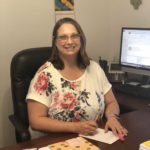 Shelley Cotten is the Coordinator of Operations and Scholarships for the McLennan Community College Foundation. A native of Lubbock, TX, she and her husband moved to Waco from Swan River, Manitoba in 2013. They have a daughter, son-in-law, two grandchildren, and two dogs. The grandchildren, of course, have top billing.
Shelley Cotten is the Coordinator of Operations and Scholarships for the McLennan Community College Foundation. A native of Lubbock, TX, she and her husband moved to Waco from Swan River, Manitoba in 2013. They have a daughter, son-in-law, two grandchildren, and two dogs. The grandchildren, of course, have top billing.
Whether it’s playing trumpet in the “Friday Band” at MCC, or riding with the Waco Knight Riders, or an afternoon playing with the Waco Disc Golf Association, one of the wonderful things about Waco is that there are lots of ways to find community here. Where do you find community in Waco? Would you be interested in writing about it? If so, let us know. Email [email protected]. If you have an idea for a post. You could be seeing your own picture on this page!
By Glenn Robinson
One of the hallmarks of the information age economy is consumerism – in this instance, defined as businesses making their goods and services more convenient, affordable, or otherwise desirable to customers.
For years, virtually every segment of our economy has embraced this trend… except healthcare. At least until recently. Increasingly, healthcare consumers are expecting that their experience with healthcare providers mirror the experience they have with some of the world’s top brands.
This rise in healthcare consumerism will continue according to a recent brief by Rice University’s Baker Institute for Public Policy. Not only have consumer expectations and experiences with other industries helped drive this trend, but so has the increasing popularity of high deductible health plans and incentives offered to those covered to make cost-effective choices.
In other words, as the financial burden of healthcare decision-making shifts to patients, patients are more apt to become more conscientious and expect more out of those rendering healthcare services.
This trend towards healthcare consumerism has already led to many noticeable changes in industry practices. The growing number of convenient walk-in clinics and the introduction of telemedicine are manifestations, as is the increasing focus healthcare providers put on patient experience surveys and online reviews. An entire cottage industry has grown up around healthcare design and construction to make the care environment more warm, welcoming, and comfortable.
However, one big obstacle still remains to true healthcare consumerism – pricing transparency.
It’s a complex issue, but one many organizations are working to solve.
You know having a health insurance policy is important, but equally as important is understanding what is in the policy so you can plan accordingly. Unfortunately, much of the language used in health insurance plans isn’t part of the everyday vernacular. With that in mind, here are some common terms and what they mean.
A premium is the amount of money you or your employer pays monthly or annually for your health insurance.
The deductible is how much you must pay out of pocket before your insurance starts to pay. Keep in mind, though, many preventive health services don’t require you to pay a deductible.
Co-insurance is how much you must pay out of pocket even after meeting your deductible. For instance, 80/20 co-insurance means you’re still responsible for paying 20 percent of charges.
This is different from a co-pay, which is a flat fee – for example 20 dollars – you might have to pay for a doctor’s visit.
Maximum out-of-pocket expenses are the most amount of money you will be required to pay per year for deductibles and co-insurance.
The term covered expenses refers to what medical services or prescriptions are or aren’t paid for by a plan.
Beyond these terms, if you don’t understand something about your plan, how it works, and what it covers, you can call the toll-free number on the back of your health insurance card. Most reputable insurance companies have staff trained to explain the ins and outs of every policy.
Most Americans appear to believe: your health is your wealth. While wealth sometimes can create its own problems, health inevitably is a source of happiness… and the value of health increases with age, usually surpassing the importance of wealth.
If you had a choice, would you spend your time striving for health or wealth? A majority of Americans pick health, according to a survey by TD Bank. The company surveyed over 1,000 U.S. consumers who made a 2018 New Year’s resolution.
The top goal of respondents was to eat better, with 54 percent citing it as their priority. The top financial goal was to save more and spend less, with 39 percent selecting it as a priority. Millennials – young adults between ages 22 and 37 – said eating healthy and getting in shape or staying fit is more important than saving more and spending less money.
Health and wealth are not mutually exclusive. About 41 percent of those who indicated they were satisfied with their financial health are more likely to be satisfied with their physical health, emotional health, and family well-being.
People with good health are more likely to have the energy and stamina to excel in the workplace, and they are less likely to spend time and effort dealing with the debilitating effect of chronic health conditions and disabilities.
Although most respondents said they are less confident they will achieve their goals to get in shape, they are more likely to seek advice for financial issues. Health typically is something that you earn if you are persistent and disciplined – it cannot be bought.
This report, and other episodes, are available at KWBU.org.
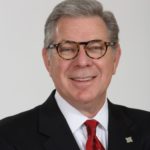 Glenn Robinson is the President of Baylor Scott & White Medical Center – Hillcrest. He has over 30 years of experience in hospital and health care management, and currently serves on several Boards associated with the Texas Hospital Association and the American Hospital Association. In addition, Glenn is Past-Chair and an active member of the Greater Waco Chamber of Commerce, and serves on the Prosper Waco Board.
Glenn Robinson is the President of Baylor Scott & White Medical Center – Hillcrest. He has over 30 years of experience in hospital and health care management, and currently serves on several Boards associated with the Texas Hospital Association and the American Hospital Association. In addition, Glenn is Past-Chair and an active member of the Greater Waco Chamber of Commerce, and serves on the Prosper Waco Board.
The Act Locally Waco blog publishes posts with a connection to these aspirations for Waco. If you are interested in writing for the Act Locally Waco Blog, please email [email protected] for more information.
(This post is a part of a regular series “Trails & Trials,” a monthly adventure series inspiring others to experience the physical, mental, and social benefits of cycling, running or swimming in Central Texas. For more posts in this series, click here: Trails and Trials. – ALW)
By Natasha van der Merwe
“Have you ever decided to train for a triathlon but just didn’t know where to start? We’ve got the training group you’ve been looking for. You’re not going to get left in the dust with this training plan!”
It’s the ideal welcome to someone new to the sport. Training for one sport is hard enough, let alone 3 sports that require a bunch of different equipment and skills.
When I was introduced to the sport 10 years ago, my first stop was the local bike/ triathlon store. I hoped that they would have the solutions to what I would require and how I would go about making triathlon my new sport. They had that and more. I left that day with a new bike, bike shoes, helmet, and swimming goggles and a list of all the local triathlon clubs in my hand.
I proceeded to contact each club and was kindly invited to try a group run, swim or bike session of my choosing. I picked a swim session, and pulled up to the pool to find 30 other people ranging mostly from 30-50 years in age and in all shapes and sizes, chatting with each other about their previous races as they were about to hop in the pool. The energy was felt through the entire session, not only from the triathletes, but the enthusiastic coach who knew a brand new triathlete had been born and hooked for life. Triathlon really is life changing once you experience it.
If you are getting serious about triathlon or simply want to get more acquainted with the sport, here are my reasons why you should start by joining a triathlon club.
Community.
Perhaps the most obvious reason to join a triathlon club, is the community that goes along with it. Many people find that triathlon not only offers a fun pastime, but also a great group of people who can eventually turn into good friends. Triathlon clubs and groups are known for being very accepting, and having a ‘more the merrier’ attitude. They will welcome you with open arms and guide you every step of the way.
Training Motivation.
You will find a wide range of ability levels in every triathlon club. Some people will be competitive veterans preparing for an IRONMAN triathlon. Others will be fresh learners just hoping to finish their first race ever. Encouragement will be abundant. If you are looking for a way to stay motivated, a triathlon club will provide the accountability and inspiration you need when facing those dawn breaking wake up calls and early morning sessions before work.
Workout and Race Tips
Very few of us have time to figure out the best way to train for an upcoming race. You can get some ideas from reading blogs and articles from professional triathletes or coaches or reading triathlon training books. The best resource is the network of personal experience passed from one athlete to another. Triathlon clubs provide that network and are a great place to take advantage of knowledge from others that have been there and done that. Many triathlon clubs also have a newsletter, blog, and forum for easy online notes sharing and learning opportunities.
Opportunity to Teach
For experienced triathletes, one of the most rewarding benefits of being part of a triathlon club is the opportunity to pass experience on to newer participants. Even someone who has done just a handful of races will have hard-learned lessons that a newbie would be very interested in learning. While reading articles from websites is a great way to learn, there is no substitute for being taught by someone who has previously done it. It is a way to pay the sport back. Everyone who has participated in a number of triathlons, once had a mentor who helped them get past the first one or two. Now it can be your turn to be the mentor.
Check out your local triathlon club – Waco Tri club – www.wacotriclub.org . I am sure they would love to have you come try a workout and get to know the members before taking the leap into the endurance world. Warning – there is typically no turning back, but it’s the most rewarding leap you will ever take.
 Natasha van der Merwe is originally from South Africa. She is mom to a 19-month old girl, former professional tennis player and tennis instructor, and a professional triathlete representing Bicycle World and Waco Running Company. She has multiple top 10 finishes in Ironman and 70.3 events around the world. She is Director of Team Programs for Bicycle World, Texas
Natasha van der Merwe is originally from South Africa. She is mom to a 19-month old girl, former professional tennis player and tennis instructor, and a professional triathlete representing Bicycle World and Waco Running Company. She has multiple top 10 finishes in Ironman and 70.3 events around the world. She is Director of Team Programs for Bicycle World, Texas
The Act Locally Waco blog publishes posts with a connection to these aspirations for Waco. If you are interested in writing for the Act Locally Waco Blog, please email [email protected] for more information.
(Gloria Conatser, a student at Waco High, was one of 25 students nationwide selected to present their National History Day documentaries at the Smithsonian National Museum of African American History and Culture at this year’s National History Day event. In today’s blog post she shares a bit about what this opportunity meant to her. — ALW )
“Those who don’t know history are bound to repeat it.” – George Santayana
By Gloria Conatser
I have always bothered my teachers with my questions, and the best of them have humored my curiosity. National History Day has allowed me to pursue the answers to my questions myself. In the past six years since I began creating documentaries, every question that I have been able to answer has uncovered ten more for me to follow. Every year, this year especially, my products have been about revealing the events that shaped today.
A big recurring theme in every corner of history is the presence of conflict, and this year’s National History Day theme, “Conflict and Compromise” could be interpreted in many ways.
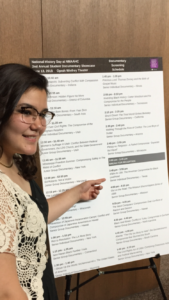 The approach that I chose to take was one that highlights the dark angle of compromise. Merriam-Webster describes it as, “a concession to something derogatory or prejudicial.” The title of my documentary this year is “3/5ths to Thirteenth: The American Compromise of Black Livelihood.” As I explored the 3/5ths Compromise and Thirteenth Amendment, and outlined their modern implications, I learned that the livelihood of Black Americans has been compromised throughout our history by people who don’t have to face the consequences.
The approach that I chose to take was one that highlights the dark angle of compromise. Merriam-Webster describes it as, “a concession to something derogatory or prejudicial.” The title of my documentary this year is “3/5ths to Thirteenth: The American Compromise of Black Livelihood.” As I explored the 3/5ths Compromise and Thirteenth Amendment, and outlined their modern implications, I learned that the livelihood of Black Americans has been compromised throughout our history by people who don’t have to face the consequences.
National History Day has given me the opportunity to exercise mental muscles in a way that is not a standard in the public education system. I have had the freedom to analyze hidden histories, create a product that reflects my research, and hold my own among academic leaders from the local to the national level.
 During the week of National History Day, I had the opportunity to present my documentary at the new Smithsonian National Museum of African American History and Culture. A few days before flying to Washington D.C. I was notified that my work had been selected. The day after National History Day judging I was featured in the Smithsonian and offered an experience that I never would have been able to dream of.
During the week of National History Day, I had the opportunity to present my documentary at the new Smithsonian National Museum of African American History and Culture. A few days before flying to Washington D.C. I was notified that my work had been selected. The day after National History Day judging I was featured in the Smithsonian and offered an experience that I never would have been able to dream of.
 The ultimate takeaway from these years as a National History Day student has been experience: experiencing perspectives that I would otherwise be blind to, experiencing locations many can only dream of, and experiencing the fulfillment of earning these opportunities myself. Practically speaking, I am as capable as most people, and vice versa, but the difference is that I am aware of my abilities and the potential for impact that I have, and that has made all the difference.
The ultimate takeaway from these years as a National History Day student has been experience: experiencing perspectives that I would otherwise be blind to, experiencing locations many can only dream of, and experiencing the fulfillment of earning these opportunities myself. Practically speaking, I am as capable as most people, and vice versa, but the difference is that I am aware of my abilities and the potential for impact that I have, and that has made all the difference.
 Gloria Conatser is a rising senior at Waco High. This is her fifth Year competing at National History Day. Gloria hopes to study engineering or biology and ultimately become an Astronaut. She also aspires to help create a more equal future through her career.
Gloria Conatser is a rising senior at Waco High. This is her fifth Year competing at National History Day. Gloria hopes to study engineering or biology and ultimately become an Astronaut. She also aspires to help create a more equal future through her career.
The Act Locally Waco blog publishes posts with a connection to these aspirations for Waco. If you are interested in writing for the Act Locally Waco Blog, please email [email protected] for more information.
by Rebecca McCumbers Flavin
Election Day is right around the corner, and the League of Women Voters of Waco wants you (YES, YOU!) to be a Waco, Texas voter! In this blog post, we provide a step-by-step guide with something for everyone – from first time voters to those who have never missed an election.
You are not registered to vote in McLennan County, Texas
Good news – there is still time! The deadline to register or update your registration before the 2018 General Election is Tuesday, October 9. You are eligible to register if you are a U.S. citizen who will turn 18 years old by election day. You may submit your registration as early as two months before your 18th birthday. If you are a college student, you may register to vote at either your school address or your home address. LWV-Texas has a great website with step-by-step instructions to help students register to vote. If you are a convicted felon, you may register to vote once you have completed your punishment phase, which includes any court-ordered period of incarceration, parole, supervision, or probation, as explained on the Texas Secretary of State’s website.
There are several ways you can register:
- Fill out the registration online, print it, and mail it in: While Texas does not have online voter registration, you can use this online tool to fill out an application on your computer. Simply print, sign, and stamp your application and mail it to: Elections Administrator, Kathy E. Van Wolfe, P.O. Box 2450, Waco, TX 76703-2450. If you do not live in McLennan County, you will find a list of all Texas county voter registration officials’ mailing addresses at this link.
- Obtain a hard copy registration application: Voter registration applications are available at the McLennan County Elections Office, located at 214 N 4th Street, Suite 300, Waco, TX, 76701. Applications are also available at libraries, government offices, and high schools.
- Get a voter registration application mailed to you: You can request a postage-paid voter application form using this link.
For all of these options, make sure your application is postmarked by Tuesday, October 9 so that you are registered in time for the General Election on November 6th. Once you have submitted your registration, you are one step closer to being a Waco, Texas voter! See #3 below to make your plan to vote.
You are registered to vote in McLennan County but have not voted in a while, you are not sure if you are registered, or you recently moved and are not sure if your address is up-to-date
The first step is to check your voter registration to make sure it is up-to-date with your current address. You will be asked to enter your date of birth along with either your Voter ID number or your Texas Driver’s License number. Alternately, you can enter your name, county, date of birth, and ZIP Code. If you are not registered or need to update your registration, see #1 above. If you are registered, see #3 below to make your plan to vote.
You are registered to vote in McLennan County
It is never too early to make your plan to vote! Do the voter “two-step,” and make your plan for the General Election.
Step 1 – Plan when and where to vote:
In-person voting:
We recommend that you make an appointment with yourself to vote.
Plan when: Early voting begins Monday, October 22nd and continues daily through Friday, November 2, 2018. Election Day is Tuesday November 6. That means you can vote anytime beginning October 22nd until Election Day EXCEPT for November 3, 4, and 5. On the McLennan County Elections website you will find the schedule of times when the polls are open each day during early voting. On Election Day all polling places are open from 7:00 AM to 7:00 PM.
Plan where: On the McLennan County Elections website you will find a list of early voting locations, if you plan to vote October 22 – November 2. There is a longer list of polling places for Election Day. In McLennan County you may vote at ANY of the designated voting centers. Check out the lists, and choose a site that is convenient for your daily commute to work, school, or running errands.
Plan to have the proper ID: Texas law requires that you present a photo ID at the polls. You will find the list of acceptable photo IDs here. If you do not have one of the required photo IDs, you may present an alternate form of supporting identification. You will also be asked to complete “Reasonable Impediment Declaration,” as described here.
Ballot by mail:
Determine if you are eligible: If you are 65 and over, are disabled, are going to be out of the county, or are in jail, you may apply for a ballot by mail.
Apply: For voters 65 and over and disabled voters, if you already submitted an annual application for a ballot by mail, you do not need to reapply. Your ballot will be mailed to you after September 4. For those who are not 65 and over or disabled, you will need to submit your application by Friday, October 26. Note that is the deadline your application must be received, not the deadline it should be post marked. We recommend mailing your application at least one week in advance to be safe.
Submit your ballot: Ballots should be submitted by 7:00 PM on Tuesday, November 6. See step 2 below as you complete your ballot.
Step 2 – Learn about the candidates:
Visit VOTE411, an online voters’ guide provided by the League of Women Voters Education Fund. At VOTE411 you can see races on your ballot and compare candidates’ positions side-by-side; candidate information for the General Election will be available in October. You may even print out your ballot with candidate choices and bring it with you to the polls. Note: while you may bring a paper copy of your voters’ guide, you may not bring your phone or electronic device into the voting booth.
Now that you are prepared to be a Waco, TX voter, share your plan with a family member or friend and help them make their plan to vote, too!
 Rebecca McCumbers Flavin serves as Co-Communicator for LWV-Waco, leading the taskforce that focuses on voter registration and get out the vote activities. Dr. Flavin is also a Senior Lecturer in Political Science at Baylor University. The League of Women Voters (LWV) is a non-partisan organization that for nearly 100 years has advocated protecting the right to vote and encouraging the exercise of that vote. The Waco chapter was reformed in 2017 as a League-at-Large under LWV-Texas. In the past year LWV-Waco has hosted several events, including a voter candidate forum for the March 2018 Primary, voter registration drives, a movie night, and an educational walk co-hosted by Waco Walks. To join or learn more about LWV, follow us on Facebook by searching for League of Women Voters of Waco, or contact the local chapter at [email protected] .
Rebecca McCumbers Flavin serves as Co-Communicator for LWV-Waco, leading the taskforce that focuses on voter registration and get out the vote activities. Dr. Flavin is also a Senior Lecturer in Political Science at Baylor University. The League of Women Voters (LWV) is a non-partisan organization that for nearly 100 years has advocated protecting the right to vote and encouraging the exercise of that vote. The Waco chapter was reformed in 2017 as a League-at-Large under LWV-Texas. In the past year LWV-Waco has hosted several events, including a voter candidate forum for the March 2018 Primary, voter registration drives, a movie night, and an educational walk co-hosted by Waco Walks. To join or learn more about LWV, follow us on Facebook by searching for League of Women Voters of Waco, or contact the local chapter at [email protected] .
The Act Locally Waco blog publishes posts with a connection to these aspirations for Waco. If you are interested in writing for the Act Locally Waco Blog, please email [email protected] for more information.
Footnotes:
[1] The Comparative data is reported in the University of Texas’ “2018 Civic Health Index.” Voter turnout and registration statistics are those reported by the Texas Secretary of State’s office.
By Carla Pendergraft, Director of Marketing, Waco Convention & Visitors Bureau
 What’s up with the pineapple? The pineapple has long been recognized as a traditional expression of welcome and hospitality throughout the South. Appearing on all sorts of décor, including gateposts, door knockers, and fountains, the fruit symbolizes those things we appreciate in a home: warmth, welcome, friendship and hospitality. So it is not surprising that we have chosen the pineapple as the symbol of a new Waco Tourism Ambassador program!
What’s up with the pineapple? The pineapple has long been recognized as a traditional expression of welcome and hospitality throughout the South. Appearing on all sorts of décor, including gateposts, door knockers, and fountains, the fruit symbolizes those things we appreciate in a home: warmth, welcome, friendship and hospitality. So it is not surprising that we have chosen the pineapple as the symbol of a new Waco Tourism Ambassador program!
“Be a Pineapple”
There is an old saying that we should all be like pineapples: stand tall, wear a crown, and be sweet on the inside. We are asking Wacoans to be pineapples! If we are more like a pineapple to our visitors (around 2.5 million annually), WE will become part of their lifelong memories. A happy visitor spends more money in our economy, thereby creating more jobs for Wacoans. Over 5,700 people are employed in the tourism industry in McLennan County – that’s a lot of jobs! Wacoans that love our City are what create the memories people remember.
In the soft launch of this program we have received so many great ideas to move forward and had so much enthusiasm from residents, merchants and new organizations to Waco. So many have asked to be involved and offered their help, we appreciate it!
Making Visitors Feel Welcome
Need ideas? Here are a few ways Wacoans can make sure visitors feel welcome:
- When you see someone who looks a little lost, offer your assistance with directions.
- When you hear people ask about what there is to see and do in Waco, offer your recommendations and suggest something fun that Waco has to offer! Not sure about what’s going on? Visit the Convention and Visitors Bureau website at: https://wacoheartoftexas.com/
- If you own a business, use a pineapple as a conversation starter with visitors. Maybe a stencil of a pineapple on the side of your building with the hashtag #wacopineapple, or a real pineapple at the front desk.
- When you see someone who looks like a tourist, reach out to them and ask them where they are from! Start a conversation! We have had visitors from all over the world recently.
There are so many ways to help people have a wonderful visit to Waco.
How the Program Works & How to Get Cool Swag
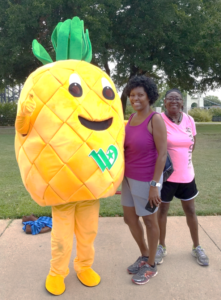 Just reach out and help a visitor in some positive way. Catch a photo of you and the visitor, and then nominate yourself (or someone else) at whatswiththepineapple.com. We’ll send those selected a Waco Tourism Ambassador t-shirt or a pin.
Just reach out and help a visitor in some positive way. Catch a photo of you and the visitor, and then nominate yourself (or someone else) at whatswiththepineapple.com. We’ll send those selected a Waco Tourism Ambassador t-shirt or a pin.
Visitors to Waco can get involved, too. If someone in Waco goes the extra mile to make them feel welcome, the tourist can nominate them as a Waco Tourism Ambassador. Photos are needed so we can celebrate! Let’s build that hashtag of positivity online!
The EVENT
We are launching the campaign with a free event, August 31st at the Waco Convention Center, Brazos Room South. Join us from 3 p.m. to 4:30 p.m., with a brief program at 3:30 p.m., and a performance by Waco’s own, Holly Tucker who will unveil a new song specific to this program. We’d love to see as many Wacoans there as we can!
Share Your Waco Pineapples
Do you see a pineapple that a business is using as a conversation starter with visitors? Or have you spotted a pineapple used in an architectural element? Share them with us by posting on Facebook or Instagram, and use the hashtag #wacotxpineapple!
The Pineapple in History
Christopher Columbus encountered the pineapple on his second voyage to the Caribbean region. Due to its rarity, expense, and striking beauty, it became a special gift for gift-giving occasions. Dinner guests served the exotic fruit felt particularly honored by a hostess who obviously spared no expense to ensure her guests felt special. Over time, it becomes incorporated into decorative elements in the home and in public spaces.
The Pineapple in Waco
Waco has long been a crossroads for travelers to Texas. The historic Suspension Bridge, built in 1870, allowed travelers to safely cross the Brazos River.
Pineapples appear as decorative elements in at least two downtown Waco locations: a wrought-iron fence in Indian Spring Park, and the Waco Foundation fountain in Heritage Square. If you find pineapples featured elsewhere in Waco, be sure to take a photo and let us know.
Want to be an extra in a video with Holly Tucker?
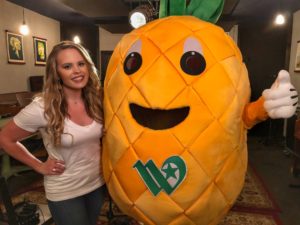 We’re shooting a scene with Holly Tucker for our ‘Welcome to Waco’ Tourism Ambassador campaign video and we need some extras for a shot on Austin Avenue. (You don’t have to do anything but clap and smile and it won’t take long at all.) We’ll be walking Austin Avenue in front of the Hippodrome. Everyone is welcome, wearing uniforms is fine. Dogs and kids are also welcome.
We’re shooting a scene with Holly Tucker for our ‘Welcome to Waco’ Tourism Ambassador campaign video and we need some extras for a shot on Austin Avenue. (You don’t have to do anything but clap and smile and it won’t take long at all.) We’ll be walking Austin Avenue in front of the Hippodrome. Everyone is welcome, wearing uniforms is fine. Dogs and kids are also welcome.
- Date: August 21
- Time: 10 AM – 10:45
- Location: In Front of the Hippodrome
 Carla Pendergraft is the Director of Marketing for the Waco Convention & Visitors Bureau, the official destination marketing organization for the Waco area. She has worked since 1990 in various positions within the Convention Center and CVB. She has a master’s degree in business from Texas State University. Her early career was with Citicorp Diners Club in Chicago, Illinois in management and marketing communications. Carla is the proud grandmother of Aviana, who is 6 years old, and a newborn granddaughter named Rose.
Carla Pendergraft is the Director of Marketing for the Waco Convention & Visitors Bureau, the official destination marketing organization for the Waco area. She has worked since 1990 in various positions within the Convention Center and CVB. She has a master’s degree in business from Texas State University. Her early career was with Citicorp Diners Club in Chicago, Illinois in management and marketing communications. Carla is the proud grandmother of Aviana, who is 6 years old, and a newborn granddaughter named Rose.
The Act Locally Waco blog publishes posts with a connection to these aspirations for Waco. If you are interested in writing for the Act Locally Waco Blog, please email [email protected] for more information.
By the Greater Waco Chamber of Commerce Staff
What is it about Waco that makes it so appealing to new businesses? At the Greater Waco Chamber of Commerce, our economic development team is constantly working to grow the economy through the attraction of new businesses to the region and the expansion of our existing industry base. Having already announced $119 million in new industrial investment for 2018, the level of interest in the community is strong. Not only has Waco become a desired destination for visitors, more businesses and individuals are taking notice of our strong assets and choosing this city as the ideal location for both professional and personal success. In fact, McLennan County is outpacing the seven-county region, Texas and the U.S. in labor force, making Waco a magnet for talent and commerce.
Here are five things that we think make Waco a great place to do business:
1. Waco is centrally-located. Waco’s location in the “Texas Triangle” positions the community as a central point for connectivity and growth. Identified as one of 11 mega-regions in the United States, is roughly formed around the D/FW region, Austin, San Antonio and Houston, with Waco located right in the middle. A recent article published by D Magazine in Dallas, indicates this region is home to more than 20 million people and produces nearly $1.3 trillion a year in economic output, ranking 17th among world economies. Interstate 35 also plays a big part in Waco’s economic success, providing easy access throughout Texas and the United States.
2. Waco is home to five outstanding, diverse institutions of higher education. Waco is fortunate to have higher education opportunities for people of each and every walk of life, which is important to businesses who are looking for a strong talent pipeline. Baylor University, the oldest institution of higher learning in the state of Texas and the largest Baptist university in the world, offers a combined 258 baccalaureate, masters and doctoral programs, according to the Baylor website. McLennan Community College (MCC) offers multiple associate degree programs at affordable costs that are designed to be transferable to bachelor’s degree programs at senior-level institutions. Through its partnerships at the University Center at MCC with universities across Texas, including, Texas Tech University at Waco and Tarleton State University Waco, students can easily transition into affordable bachelor’s degree programs without having to leave Waco. Texas State Technical College (TSTC) is the technical training college for Texas. Headquartered in Waco, this diverse two-year technical college focused on student success in learning and preparation for future careers offers over 40 associate’s degree and/or certification programs and boasts a high student job placement rate after graduation.
3. Waco provides an awesome quality of life. The cost of living is affordable, and the business climate is supportive and welcoming. With initiatives like Start Up Waco, partnering with resource providers across Greater Waco to provide knowledge, work space and access to capital, entrepreneurs will have more connectivity into the Waco-McLennan County entrepreneurial ecosystem than ever before. Already, new businesses are popping up across the community and finding success entering the marketplace. Waco is home to an abundance of natural resources, including the Brazos River and Lake Waco. Cameron Park is one of the largest municipal parks in the state, with beautiful trees, a natural habitat zoo, access to the Brazos and Bosque rivers, and a huge network of trails that vary from beginner to expert level.
4. Waco has a strong spirit of collaboration. Waco believes in partnering for success. Few places see local governments, the business community, education institutes, and non-profit organizations working together on common goals for growth and success. We all are working together to grow and diversify our economy and create prosperity for everyone.
5. Waco’s flourishing tourism market is evidence of what an incredible place Waco truly is. With over two million visitors every year, it’s obvious that people enjoy visiting Waco. Visitors see Waco in a different light – they meet the kind, loving community of people who live here; they interact with the positive, supportive businesses; they have wonderful experiences that keep them coming back again and again.
Waco has transformed into a truly vibrant community that is primed and ready for new businesses to put down roots. We’re experiencing a very unique, exciting time here in Waco, and we are so thankful to have opportunities to show off our city.
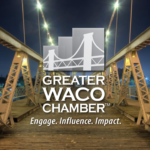
Written by Greater Waco Chamber of Commerce Staff.
The Act Locally Waco blog publishes posts with a connection to these aspirations for Waco. If you are interested in writing for the Act Locally Waco Blog, please email [email protected] for more information.
By Jaja Chen
I often hear individuals make comments about teachers that make it seem as if they have it “well off” because of having summer vacations. While having summer off is a crucial part of teachers’ self-care and work-life balance, we often do not sit and consider the amount of energy, finances, or even time that teachers dedicate throughout the school year – year after year – to managing their classrooms and educating our children daily.
Oftentimes, teachers’ own self-care goes by the wayside because of the immense amount of needs they must tend to in their classrooms, amongst students, and to meet all the tasks and demands they face as a teacher – even outside of the classroom. This can lead to summer being used to “catch up” on sleep, health, and self-care.
While summer can be a huge part of teacher self-care, my hope is that summer is not the ONLY time when teachers are able to take care of themselves.
Here are three ways we as a community can seek to support our teachers in self-care as they return to the new school year:
1.) Honor and encourage our teachers – Coming from a Taiwanese background, educators are highly honored, valued, and esteemed. The culture of honor that East Asian cultures place on teachers is something we can learn from. How can we honor and encourage our teachers throughout the school year? Rather than making comments about how good they have it or how they shouldn’t complain about difficulties on the job due to having summer off, how can we seek to listen to and support our teachers as they deal with ongoing work-life stress?
2.) Support healing from secondary trauma & burnout – Compassion fatigue is a common experience amongst helping professionals and is a combination of secondary trauma and burnout. Secondary trauma occurs when we continually hear about or witness, directly or indirectly, traumatic events that occur to others. Working with students and families daily exposes teachers to traumatic events and can lead to secondary trauma. Burnout, on the other hand, is feelings of ongoing exhaustion and helplessness due to inefficiencies experienced in our jobs. When our teachers experience compassion fatigue, do we judge them or do we seek to understand? Do we point them to resources, such as individual counseling, or do we shame them? As administrators, do we seek to create policies and school cultures that enhance and support teacher self-care? Are we open to our teachers taking time off for their mental health or do we stigmatize mental health recovery?
3.) Volunteer for local school efforts & initiatives – Ensuring that our students and schools are successful and thriving is a community effort. Teachers are not the sole guardians for our children’s mental, emotional, physical health, and educations. We all have a role to play in our communities as we support teachers in their self-care. Part of this is seeing how we can play a role in supporting school initiatives, school events, and to inquire about ways to support schools as volunteers. Recognizing that we have a part to play in supporting our schools helps reduce the burdens placed on teachers to be everything to our children. Ways to be involved include supporting mentoring and tutoring programs that non-profit organizations-including Communities in Schools (CIS) and Prosper Waco – host for local schools. Local churches may also have after-school programs or book clubs to support children such as the STARS Mentoring Program.
The success of our schools requires a community effort.
What are ways you can support your local school today? And if giving of your time and/or finances is not a possibility, are there ways to connect with a fellow teacher and to encourage them as they begin their new school year. My hope is that the task of teacher self-care is seen as a community effort, not just placed on teachers themselves to figure out. There are ways that our culture and perspectives can hinder teachers from thriving in the amazing work they do. Let’s strive for creating a culture of compassion, authenticity, and empathy, as opposed to shame.
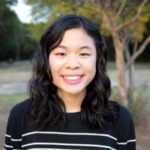 Jaja Chen, LMSW, CDWF is a private practice therapist in Waco through Enrichment Training & Counseling Solutions specializing in trauma, compassion fatigue, maternal mental health, and difficult life transitions. As an EMDR Trained Therapist, Jaja’s passion is walking alongside helping professionals whom are healing from PTSD, depression, anxiety, secondary trauma, and burnout. Jaja can be contacted via email at [email protected] or via webpage at http://enrichmenttcs.com/meet-jaja-chen/
Jaja Chen, LMSW, CDWF is a private practice therapist in Waco through Enrichment Training & Counseling Solutions specializing in trauma, compassion fatigue, maternal mental health, and difficult life transitions. As an EMDR Trained Therapist, Jaja’s passion is walking alongside helping professionals whom are healing from PTSD, depression, anxiety, secondary trauma, and burnout. Jaja can be contacted via email at [email protected] or via webpage at http://enrichmenttcs.com/meet-jaja-chen/
By Luann Jennings
This fall Creative Waco, our local arts agency, will debut an eight-week course in business skills for visual, performing, and literary artists and arts students, along with three special professional development workshops.
The course is based on Work of Art: Business Skills for Artists, developed by Springboard for the Arts in St. Paul, Minnesota. I had the privilege of visiting St. Paul in July (where the high temperature was 83…) to be trained in the curriculum, and I’m excited to share it with Waco’s artists and creatives. I’ve been teaching arts business development and entrepreneurship for a number of years, and the Work of Art program is a terrific framework for starting your creative career or moving it forward. Springboard’s instructors have taught the Work of Art content “at arts organizations, libraries and colleges in over 80 communities in the Upper Midwest, and [it has been] replicated across the country by artists, arts organizations, and colleges and universities.”
The eight sessions will cover career and business planning, goal-setting and productivity, communicating about your work, pricing, record-keeping, legal issues, and more.
We’ll also hold three additional workshops using the Work of Art material. The first will be a free introductory session on Why Artists Need Business Skills, to help potential participants decide whether Work of Art is for them (date and location TBA).
Then, in November, we’ll hold two special workshops. On Saturday, November 3, we’ll cover Marketing, Branding, and Promotion; and on Friday evening, November 16, we’ll talk about Fundraising and Grantwriting, with a special emphasis on the Creative Waco AMP Grant and Texas Commission on the Arts grants. Those registered for the eight-week course may attend the Marketing and Fundraising workshops for free, but registration will also be open to those not enrolled in the course.
Work of Art will meet weekly beginning the week of September 23 and will conclude the week before Thanksgiving. Participants may attend either a morning or weeknight session. The days and location are still being decided, but if you want to learn more when we have the info, sign up for Creative Waco’s enewsletter, follow us on social media, or write to me at [email protected] and I’ll send you the info as soon as I have it.
 Luann Jennings is the Project Manager for Artist Professional Development at Creative Waco. She is a theatre director and has been working in arts leadership, entrepreneurship, and education for a long time. Luann and her husband Chuck, a jazz guitarist you can find playing locally, moved to Waco from New York City two years ago to invest in the arts community and cultural life here.
Luann Jennings is the Project Manager for Artist Professional Development at Creative Waco. She is a theatre director and has been working in arts leadership, entrepreneurship, and education for a long time. Luann and her husband Chuck, a jazz guitarist you can find playing locally, moved to Waco from New York City two years ago to invest in the arts community and cultural life here.
